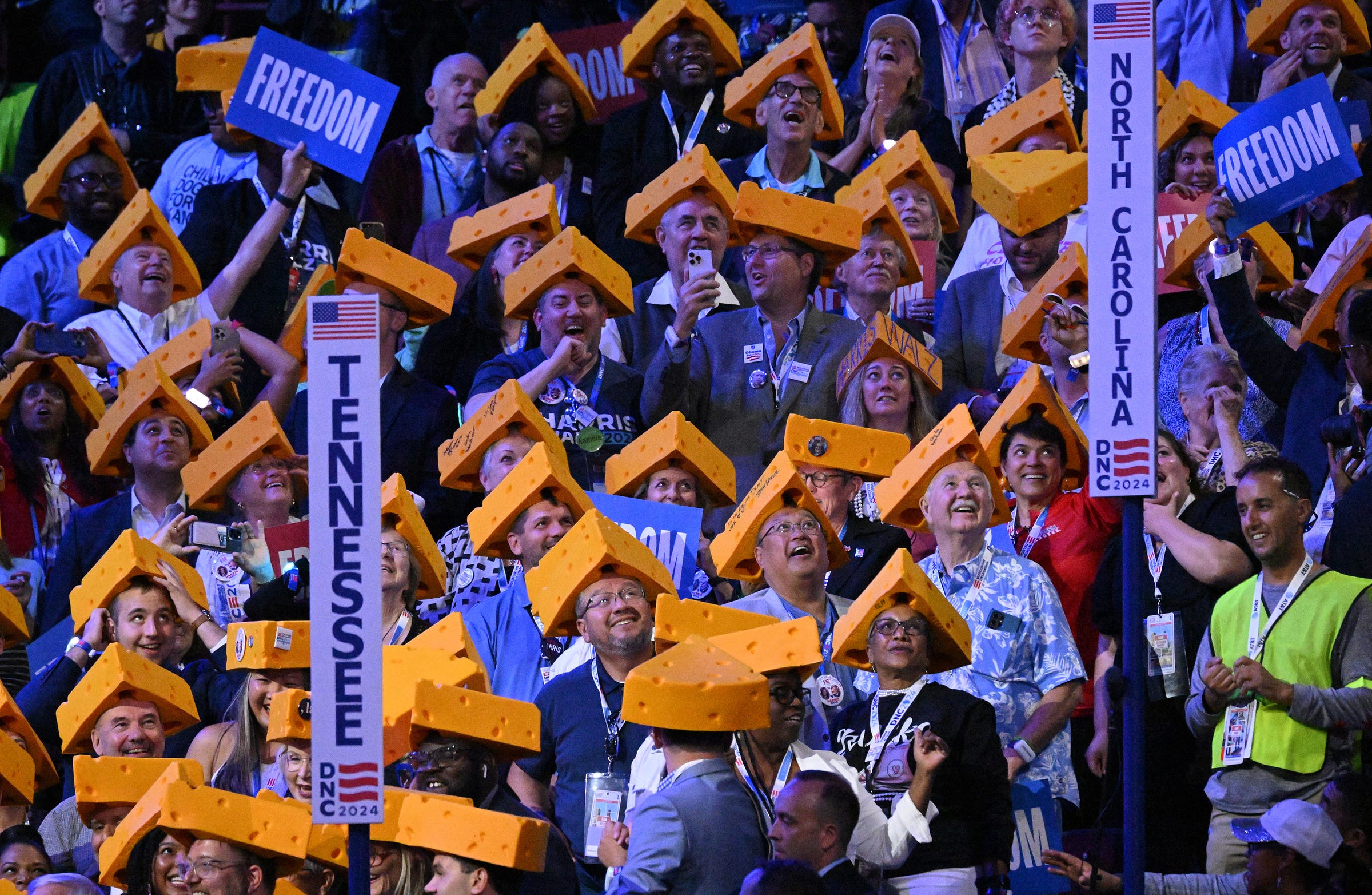
Harris–Walz Is a Food Fusion Ticket as Diverse as America
But their hotdishes and dosas reflect the same values and warmth.

HE SAID HE LIKED “WHITE-GUY TACOS.” “What does that mean, like mayonnaise and tuna?” she interrupted. “Pretty much ground beef and cheese,” he said. “Do you put any flavor in it?” she asked, trying again. “Uh no,” he replied, adding that “black pepper is the top of the spice level in Minnesota.” By then she had burst out laughing.
In a movie, this would have been the “meet cute” scene at a restaurant. In reality, it was a conversation between Vice President Kamala Harris and Minnesota Gov. Tim Walz, shortly after she picked him as her running mate. In politics, it was the perfect metaphor for the Democrats’ fusion ticket: Northern California + Southern Minnesota, with food preferences as diverse as America.
Walz, a former congressman, was a three-time winner of the bipartisan Minnesota hotdish competition on Capitol Hill. He posted his 2014 “turkey trot tater-tot” winner online during his first week on the national ticket and it not only went viral, you can even find it on FoxNews.com, in a piece that quotes nice things cooks were saying. That’s truly crossover appeal—although there is some question about whether America is truly ready for this culinary tsunami.
“Absolutely violent levels of midwestern,” tweeted Amy Ash after hearing on TV (correctly) that Minnesota Sen. Amy Klobuchar’s mother-in-law—a Walz neighbor—brought the family a chicken parm bake when their son was born. “‘The midwest’ is just one big casserole bakeware circulation racket,” Ash added.
Harris cooks for real, does it well, and also has gone viral in a video involving turkey: In November 2019, she described how to brine a turkey in the one minute she had before going on air at MSNBC. A year later, when she was vice president-elect, the clip took off. She also hilariously schooled her then-Senate colleague, Virginia’s Mark Warner, on how to make a decent tuna sandwich after he went viral in April 2020 with a video proving that he was (sorry, senator) clueless.
Convention garb in Chicago included cheesehead hats and corn-cob hats, and viewers on Wednesday night saw Mindy Kaling jokingly introduce herself as “an incredibly famous Gen Z actress” and “the woman who courageously outed Kamala Harris as Indian in an Instagram cooking video” in November 2019:
The two women bonded over their South Indian immigrant mothers while making dosas, a crepe-like Indian dish. “The thing I remember the most about the vice president is that Kamala Harris can cook! Guys, she was so much better than me!” Kaling told the convention delegates. Even so, she said, Harris complimented her “every step of the way” so that Kaling’s daughter, who was watching, would be “impressed with her mom”—a warmth and generosity of spirit she said Harris would bring to the White House.
Warmth is absolutely what comes across in the Harris cooking videos, even when she’s teasingly telling an amused Warner things like “this is a toaster” and “this is a skillet” (seriously, he had put his “tuna melt” into a microwave) or reassuring Walz, who said he was trying to expand his food horizons, that she had cantaloupe and he’d be fine.
And what is the hotdish tradition but a symbol of the neighborly caring that Walz described in his convention speech? “That family down the road, they may not think like you do, they may not pray like you do, they may not love like you do, but they’re your neighbors and you look out for them and they look out for you,” he said. “Everybody belongs and everybody has a responsibility to contribute.”
FOOD IS NOT INHERENTLY POLITICAL, which is what makes it such an effective way to start political conversations—to listen to people, understand them, quiet their doubts, make inroads in their opposition. That’s why the suffragists trying to win votes for women created suffragist cookbooks filled with recipes as well as reasons women should be able to vote. They knew they needed to entice, persuade and convert the undecided and even hostile to their cause.
As Laura Kumin writes in her 2020 book, All Stirred Up, this was the political equivalent of what sportsmen called a “still hunt.” The point was to build support while avoiding confrontation—and suffragist cookbooks were a cornerstone of the strategy in every decade. They were a non-threatening, even reassuring way to connect with women drawn to the recipes and the men who ate the food they cooked. It was a soft sell, an outreach tool for democracy.
Laura and I have embarked on our own outreach cookbook, this one to tell our country about the democracy dearth in our home of Washington, D.C. The nation’s capital has more people than Vermont or Wyoming, and we pay taxes just like other Americans. But unlike any other capital in a democracy, we do not have representation in the national legislature—no senators, no voting House member.
This is why D.C.’s license plates say “End Taxation Without Representation.” And it’s why the name of our voting rights cookbook is With Recipes and Justice For All. There are several possible remedies, but the first step is introducing our vibrant capital to our fellow citizens across the nation and making them aware that we have a problem. And eventually, maybe, as people learn about us and sample the recipes contributed by chefs, celebrities, writers, musicians, friends, and relatives, a new Harris–Walz spirit of warmth and generosity will take hold. We can hope.
Meanwhile, here are the Walz hotdish winners from 2013 and 2016: “Hermann the German Hotdish,” named after a bobblehead mascot in his congressional office, made with cheese, bratwurst, tater tots and beer, and “Turkey Taco Tot Hotdish,” made with turkey, bell pepper, green chiles, taco sauce, tater tots, and cheese.
Just in case anyone’s in the mood to create a little hotdish magic and deliver it to their neighbors.
















